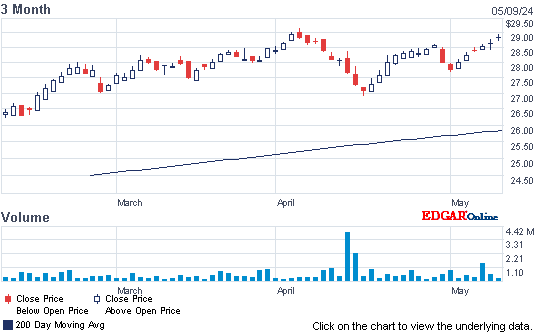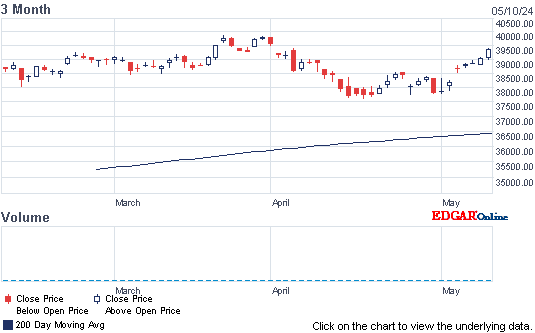Dow rose 15, decliners ahead of advancers about 5-4 & NAZ gained 25. The MLP index was off 2+ to the 306s & the REIT index fell 1+ to 341. Junk bond funds crawled higher & Treasuries continued weak, bringing the yield on the 10 year Treasury up to 2.4%. Oil slid lower (more below) & gold dropped 9 to 1216.
AMJ (Alerian MLP Index tracking fund)

Crude slipped as Libyan production climbed to the highest in more than 2 years as the OPEC member restores output & futures fell 1%. Libya’s output has reached 796K barrels a day, Mustafa Sanalla, the chairman of state producer National Oil said. Estimates are for US crude stockpiles fall by 2M barrels last week before Energy Information Administration before data is reported tomorrow. In addition to the potential extension of the OPEC deal into 2018, some ministers have also discussed the possibility of deepening their output cuts. Oil capped a 3rd weekly decline after dropping to levels last seen before OPEC agreed in Nov to reduce output. West Texas Intermediate for Jun delivery fell 29¢ (0.6%) to $46.14 a barrel. The contract rose 0.5% to $46.43 yesterday, its 2nd daily gain. US crude stockpiles have declined for 4 weeks after reaching the highest level in more than 3 decades at the end of Mar. Inventories at Cushing, Oklahoma, the delivery point for WTI & the nation's biggest oil-storage hub, probably increased by 60,K barrels last week, according to a recent forecast.
Oil Slips as Libyan Output Climbs to Highest Level Since 2014
For anyone nourished on volatility, the famine in global markets is worsening. With the French election ending in a victory for Emmanuel Macron, one more thing said to threaten global stability has made a quiet exit. For investors already looking at record-low price turbulence, the defeat of far-right candidate Marine Le Pen means even more risk removed from the table. European stock volatility measured by the Euro Stoxx 50 Volatility Index fell to the lowest since Mar yesterday, even as a 2-week advance in both the € & global stocks in the lead-up to the final vote left little room for a relief rally. At the same time, the CBOE Volatility Index decreased 7.6% to 9.77, the lowest since 1993. Volatility in the US equity market has dissipated as stock investors whistled past geopolitical unknowns from populist politics to heightened threats from North Korea. While trade agreements, tax reform & the future of financial regulation may hang in the balance, investors have instead focused on one of the best global earnings seasons in a decade & signs of economic growth. Calm has blanketed other markets as well. Volatility in Treasuries is down 24% since last month. The VIX is down 32% since the first round of French voting 2 weeks ago. Swings in the S&P 500 have also narrowed this year, with the benchmark gauge moving an average 0.31% each day, compared with 0.58% throughout 2016. That’s happened as global equity markets rally 9% so far this year, buoyed by double-digit percentage gains in European markets, led by surges in French & German shares. The explanation may lie in economic data, both in the US & abroad, that has either kept up with expectations or exceeded them. While the rate at which US economic reports beat estimates has fallen the last month, it’s roughly equal to where it began the year.
VIX Closes at Lowest Since 1993 as Trance Deepens in Market
An 8-month high in Mar job openings & a pickup in quits indicate the US labor market continues to tighten, a Labor Dept report showed. The report gives a glimpse into a weaker-than-expected reading for payrolls in Mar, when the reading was partly depressed by a snowstorm that slammed the Northeast during the survey week. While a high number of openings shows companies are still willing to hire, managers are having trouble finding skilled & experienced labor to fill open positions. A subdued level of layoffs shows they are choosing to hold onto the staff they have instead. A tightening labor market could translate to a breakout in wages after months of lackluster growth. An elevated number of people quitting their jobs shows that workers are confident enough of finding better wages elsewhere. There were 1.3 unemployed people vying for every opening in Mar, compared with 1.9 people when the recession began at the end of 2007. Manufacturing & business services were among industries posting greater openings. In the 12 months through Mar, the economy created a net 2.3M jobs, representing 62.9M hires & 60.5M separations Although it lags other Labor Dept jobs data by a month, the JOLTS report adds context to monthly payrolls figures by providing statistics including resignations, help-wanted ads & the pace of hiring.
This is one heck of a bull market. Economic indicators keep coming in only so-so while there is major unrest in DC about passing new legislation. However the volatility is at major lows. Risk is being abandoned in pursuit of more gains in the stock market. Fun while it lasts. But this will not last & a day of reckoning could get very ugly.
Dow Jones Industrials

AMJ (Alerian MLP Index tracking fund)
Crude slipped as Libyan production climbed to the highest in more than 2 years as the OPEC member restores output & futures fell 1%. Libya’s output has reached 796K barrels a day, Mustafa Sanalla, the chairman of state producer National Oil said. Estimates are for US crude stockpiles fall by 2M barrels last week before Energy Information Administration before data is reported tomorrow. In addition to the potential extension of the OPEC deal into 2018, some ministers have also discussed the possibility of deepening their output cuts. Oil capped a 3rd weekly decline after dropping to levels last seen before OPEC agreed in Nov to reduce output. West Texas Intermediate for Jun delivery fell 29¢ (0.6%) to $46.14 a barrel. The contract rose 0.5% to $46.43 yesterday, its 2nd daily gain. US crude stockpiles have declined for 4 weeks after reaching the highest level in more than 3 decades at the end of Mar. Inventories at Cushing, Oklahoma, the delivery point for WTI & the nation's biggest oil-storage hub, probably increased by 60,K barrels last week, according to a recent forecast.
Oil Slips as Libyan Output Climbs to Highest Level Since 2014
For anyone nourished on volatility, the famine in global markets is worsening. With the French election ending in a victory for Emmanuel Macron, one more thing said to threaten global stability has made a quiet exit. For investors already looking at record-low price turbulence, the defeat of far-right candidate Marine Le Pen means even more risk removed from the table. European stock volatility measured by the Euro Stoxx 50 Volatility Index fell to the lowest since Mar yesterday, even as a 2-week advance in both the € & global stocks in the lead-up to the final vote left little room for a relief rally. At the same time, the CBOE Volatility Index decreased 7.6% to 9.77, the lowest since 1993. Volatility in the US equity market has dissipated as stock investors whistled past geopolitical unknowns from populist politics to heightened threats from North Korea. While trade agreements, tax reform & the future of financial regulation may hang in the balance, investors have instead focused on one of the best global earnings seasons in a decade & signs of economic growth. Calm has blanketed other markets as well. Volatility in Treasuries is down 24% since last month. The VIX is down 32% since the first round of French voting 2 weeks ago. Swings in the S&P 500 have also narrowed this year, with the benchmark gauge moving an average 0.31% each day, compared with 0.58% throughout 2016. That’s happened as global equity markets rally 9% so far this year, buoyed by double-digit percentage gains in European markets, led by surges in French & German shares. The explanation may lie in economic data, both in the US & abroad, that has either kept up with expectations or exceeded them. While the rate at which US economic reports beat estimates has fallen the last month, it’s roughly equal to where it began the year.
VIX Closes at Lowest Since 1993 as Trance Deepens in Market
An 8-month high in Mar job openings & a pickup in quits indicate the US labor market continues to tighten, a Labor Dept report showed. The report gives a glimpse into a weaker-than-expected reading for payrolls in Mar, when the reading was partly depressed by a snowstorm that slammed the Northeast during the survey week. While a high number of openings shows companies are still willing to hire, managers are having trouble finding skilled & experienced labor to fill open positions. A subdued level of layoffs shows they are choosing to hold onto the staff they have instead. A tightening labor market could translate to a breakout in wages after months of lackluster growth. An elevated number of people quitting their jobs shows that workers are confident enough of finding better wages elsewhere. There were 1.3 unemployed people vying for every opening in Mar, compared with 1.9 people when the recession began at the end of 2007. Manufacturing & business services were among industries posting greater openings. In the 12 months through Mar, the economy created a net 2.3M jobs, representing 62.9M hires & 60.5M separations Although it lags other Labor Dept jobs data by a month, the JOLTS report adds context to monthly payrolls figures by providing statistics including resignations, help-wanted ads & the pace of hiring.
U.S. Job Openings at Eight-Month High
This is one heck of a bull market. Economic indicators keep coming in only so-so while there is major unrest in DC about passing new legislation. However the volatility is at major lows. Risk is being abandoned in pursuit of more gains in the stock market. Fun while it lasts. But this will not last & a day of reckoning could get very ugly.
Dow Jones Industrials













No comments:
Post a Comment